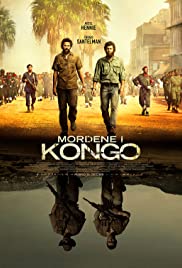
MURDER IN THE CONGO/ MORDENE I KONGO
Norway, 2018, 100 minutes, Colour.
Aksel Hennie, Tobias Santelmann.
Directed by Marius Holst.
This drama is based on actual characters and events, two Norwegians, mercenaries, friends, present in Africa, especially in the Democratic Republic of the Congo. They have been involved in various uprisings, in Uganda, in the Congo. They are ambushed at night, taken prisoner, kept in prison, a range of prisons, for quite some time, building up to court proceedings.
The film raised discussion in Norway, especially about the activities of the two men, their reputations, issues of justice – and discussions about the payments that the Norwegian government gave to the Congo.
The two actors provide strong performances, characters sometimes sympathetic, with visits from family from Norway, sometimes not sympathetic, clashes between them.
The film is interesting in terms of European- African relationships in postcolonial times, with memories of colonial oppression.
1. The title? Tone? Based on actual events? Events close to the making of the film?
2. Responses, especially in Norway, the critique of the characters, mercenaries, judgements on them? The responses from Congo and countries in Africa?
3. The locations, Uganda, the arrival, the countryside? The Congo, the terrain, the homes, villages, meetings? The ambush at night? The jungle action, the range of prisons and cells, the courts? The musical score?
4. African history, the movement towards independence, governments, war and rebellions, violence, issues of justice? Military, mercenaries, foreigners?
5. The introduction to 2 characters, Joshua and his explanation about being a mercenary, real men, action, their work in Africa, the plan for the visit, available, the contacts in Uganda, going to the Congo, the meetings, the money, the rendezvous, the bikes and truck, the designated driver? The ambush? The violence? The staging of the ambush – and the issue of who shot the driver? The authorities coming, their arresting the two?
6. The two men, the characters, friendship, bonds in the past, leadership? The guns, who did the shooting? The accusations against Moland? Joshua and his participation and support?
7. The presentation of the authorities, the violence, the squalor of the prisons, the range of prisoners, their activities, sport and the yards, the cells? The authorities and the looking down on the Europeans?
8. The years passing in prison, the use of flashbacks to fill out the background while the audience saw the men in prison? The toll of life in prison, Moland, his mental health, his behaviour in the court, defying? Medication, his illness? His hanging himself? Joshua, surviving, food, friends, becoming more emaciated, the beard, exercise? The interactions with Morland? The friendship, the difficulties, the behaviour in court?
9. Joshua, the range of lawyers and the interviews, men and women? The intervention of the Norwegian government? Moland and his thwarting the help? The behaviour in court? The visit of his mother, her staying in the Congo?
10. The effect on Joshua, the years passing, the interventions the government, his release and return to Norway? The information about the Norwegian money grants to the Congo and the reasons?
11. Audience interest in African stories – and the role of the mercenaries?